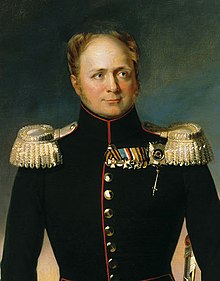
Back Aleksander I van Rusland Afrikaans 1ኛ አሌክሳንደር Amharic Aleixandre I de Rusia AN ألكسندر الأول Arabic الكسندر الاول ARZ Alexandru I de Rusia AST I Aleksandr (Rusiya imperatoru) Azerbaijani بیرینجی الکساندر (روسیه) AZB Александр I Bashkir Аляксандр I (імператар расійскі) Byelorussian
| Alexander I | |||||
|---|---|---|---|---|---|
 Portrait by George Dawe, c. 1825–29 | |||||
| Emperor of Russia | |||||
| Reign | 23 March 1801 – 1 December 1825 | ||||
| Coronation | 15 (27) September 1801 | ||||
| Predecessor | Paul I | ||||
| Successor | Nicholas I | ||||
| Born | 23 December 1777 Saint Petersburg, Russian Empire | ||||
| Died | 1 December 1825 (aged 47)[1] Taganrog, Russian Empire | ||||
| Burial | 13 March 1826 | ||||
| Spouse | |||||
| Issue more... | Nikolai Lukash (illegitimate) | ||||
| |||||
| House | Holstein-Gottorp-Romanov | ||||
| Father | Paul I of Russia | ||||
| Mother | Sophie Dorothea of Württemberg | ||||
| Religion | Russian Orthodox | ||||
| Signature |  | ||||
| Military service | |||||
| Branch/service | |||||
| Battles/wars | |||||
Alexander I (Russian: Александр I Павлович, romanized: Aleksandr I Pavlovich, IPA: [ɐlʲɪkˈsandr ˈpavləvʲɪtɕ]; 23 December [O.S. 12 December] 1777 – 1 December [O.S. 19 November] 1825),[a][2] nicknamed "the Blessed",[b] was Emperor of Russia from 1801, the first king of Congress Poland from 1815, and the grand duke of Finland from 1809 to his death in 1825. He ruled Russia during the chaotic period of the Napoleonic Wars.
The eldest son of Emperor Paul I and Sophie Dorothea of Württemberg, Alexander succeeded to the throne after his father was murdered. As prince and during the early years of his reign, he often used liberal rhetoric, but continued Russia's absolutist policies in practice. In the first years of his reign, he initiated some minor social reforms and (in 1803–04) major liberal educational reforms, such as building more universities. Alexander appointed Mikhail Speransky, the son of a village priest, as one of his closest advisors. The over-centralized Collegium ministries were abolished and replaced by the Council of Ministers, State Council, and Supreme Court to improve the legal system. Plans were madem but never consummated, to set up a parliament and sign a constitution. In contrast to his westernizing predecessors such as Peter the Great, Alexander was a Russian nationalist and Slavophile who wanted Russia to develop on the basis of Russian culture rather than European.
In foreign policy, he changed Russia's position towards France four times between 1804 and 1812, shifting among neutrality, opposition, and alliance. In 1805 he joined Britain in the War of the Third Coalition against Napoleon, but after suffering massive defeats at the battles of Austerlitz and Friedland, he switched sides and formed an alliance with Napoleon in the Treaty of Tilsit (1807) and joined Napoleon's Continental System. He fought a small-scale naval war against Britain between 1807 and 1812 as well as a short war against Sweden (1808–09) after Sweden's refusal to join the Continental System. Alexander and Napoleon hardly agreed, especially regarding Poland, and the alliance collapsed by 1810. Alexander's greatest triumph came in 1812 when Napoleon's invasion of Russia descended into a catastrophe for the French. As part of the winning coalition against Napoleon, he gained territory in Finland and Poland. He formed the Holy Alliance to suppress the revolutionary movements in Europe, which he saw as immoral threats to legitimate Christian monarchs. He also helped Austria's Klemens von Metternich in suppressing all national and liberal movements.
During the second half of his reign, Alexander became increasingly arbitrary, reactionary, and fearful of plots against him; as a result he ended many of the reforms he made earlier. He purged schools of foreign teachers, as education became more religiously driven as well as politically conservative.[3] Speransky was replaced as advisor with the strict artillery inspector Aleksey Arakcheyev, who oversaw the creation of military settlements. Alexander died of typhus in December 1825 while on a trip to southern Russia. He left no legitimate children, as his two daughters died in childhood. Neither of his brothers wanted to become emperor. After a period of great confusion (that presaged the failed Decembrist revolt of liberal army officers in the weeks after his death), he was succeeded by his younger brother, Nicholas I.
- ^ Bushkovitch, Paul (2012). A concise history of Russia. New York: Cambridge University Press. p. 154. ISBN 978-0-521-54323-1.
- ^ Maiorova 2010, p. 114.
- ^ Walker 1992, pp. 343–360.
Cite error: There are <ref group=lower-alpha> tags or {{efn}} templates on this page, but the references will not show without a {{reflist|group=lower-alpha}} template or {{notelist}} template (see the help page).
© MMXXIII Rich X Search. We shall prevail. All rights reserved. Rich X Search